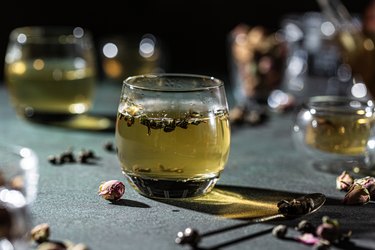
High cholesterol can have a major effect on your heart health, eventually leading to clogged arteries and related heart problems, says the Mayo Clinic. Your diet is key for keeping cholesterol levels in check, and there's evidence that specific foods, such as green tea, may help.
Read more: How Much Green Tea Should You Drink Per Day?
Video of the Day
Video of the Day
Diet for Lowering Cholesterol
Overall, the components of a cholesterol-lowering diet are fairly straightforward, and could be beneficial to even those without high cholesterol. According to the federal government's Dietary Guidelines for Americans, these components include:
- Plentiful fruits, vegetables and whole grains.
- Lean sources of meat and dairy.
- Heart-healthy fats found in nuts, olive oil and fish.
- Low amounts of red meat or high-fat dairy products.
When you combine these steps with weight loss, regular exercise and not smoking, the Mayo Clinic notes that they can be important lifestyle steps in reducing your cholesterol — though you should still follow your doctor's recommendations closely with regard to cholesterol-lowering medications.
Green Tea to Lower Cholesterol
Along with the basic components of a heart-healthy diet, certain specific foods or supplements may also give a boost to your cholesterol-lowering powers. For example, the Mayo Clinic explains that artichoke extract, fish oil, flaxseed, niacin, oat bran and soy protein are just a few of the many supplements that may affect cholesterol levels. Green tea is another supplement that's very easy to incorporate into your daily routine in a different way — as a refreshing drink.
"Some studies suggest that drinking green tea may lower LDL cholesterol ('bad' cholesterol) and triglycerides (stored in fat cells)," says Rebecca Yellin, RD, a registered dietitian with Montefiore Health System in New York City. "Having high LDL cholesterol and triglycerides have negative impacts on heart health. Researchers pose that catechins, a type of antioxidant found in green tea, is responsible for lowering these levels."
In September 2020, researchers writing in Nutrition Journal published a review of 31 studies with more than 3,000 subjects that looked at the impact of green tea on cholesterol levels. What they discovered was that green tea has a significant effect on levels of bad LDL cholesterol and total cholesterol. It had less of an impact on triglyceride levels. What's more, green tea did not affect levels of good HDL cholesterol, the review said.
Other research on green tea and cholesterol has proven equally promising. A review article published in August 2017 in Molecular Nutrition & Food Research looked at the results of 21 studies on green tea consumption and cholesterol that involved 1,704 people with overweight or obesity.
The analysis showed that green tea consumption had a significant effect on cholesterol levels among the study participants. Specifically, it substantially lowered levels of total cholesterol and LDL cholesterol.
Another study published in June 2018 in the Journal of the American Heart Association examined the effect of tea (not just green tea) consumption on the levels of "good" HDL cholesterol in more than 80,000 Chinese adults. The study participants had their HDL cholesterol measured in 2006, 2008, 2010 and 2012.
What the researchers discovered was that HDL cholesterol, which naturally declines with age, decreased at a slower rate in those who drank more tea than it did in those with lower tea consumption.
How to Consume Green Tea
While a variety of green tea supplements are available, Yellin recommends sticking with drinking the occasional cup of green tea as an alternative to water to derive the heart-healthy benefits of the beverage.
"In some of these studies, participants drink upwards of five cups per day," she says. "This is not a realistic daily intake. Instead of telling individuals to drink five cups a day, one can be included with other heart-healthy dietary choices."
Read more: What Is the Best Green Tea?
- Mayo Clinic: “Coronary Artery Disease - Symptoms and Causes"
- Mayo Clinic: “Cholesterol-Lowering Supplements May Be Helpful”
- Nutrition Journal: “Effect of Green Tea Consumption on Blood Lipids: A Systematic Review and Meta-Analysis of Randomized Controlled Trials”
- Journal of the American Heart Association: “Tea Consumption and Longitudinal Change in High‐Density Lipoprotein Cholesterol Concentration in Chinese Adults”
- Molecular Nutrition & Food Research: “Effects of Green Tea on Lipid Metabolism in Overweight or Obese People: A Meta-Analysis of Randomized Controlled Trials”
- Rebecca Yellin, RD, registered dietitian, Montefiore Health System, New York City
- U.S. Department of Agriculture and U.S. Department of Health and Human Services: "Dietary Guidelines for Americans, 2020-2025"
Is this an emergency? If you are experiencing serious medical symptoms, please see the National Library of Medicine’s list of signs you need emergency medical attention or call 911.